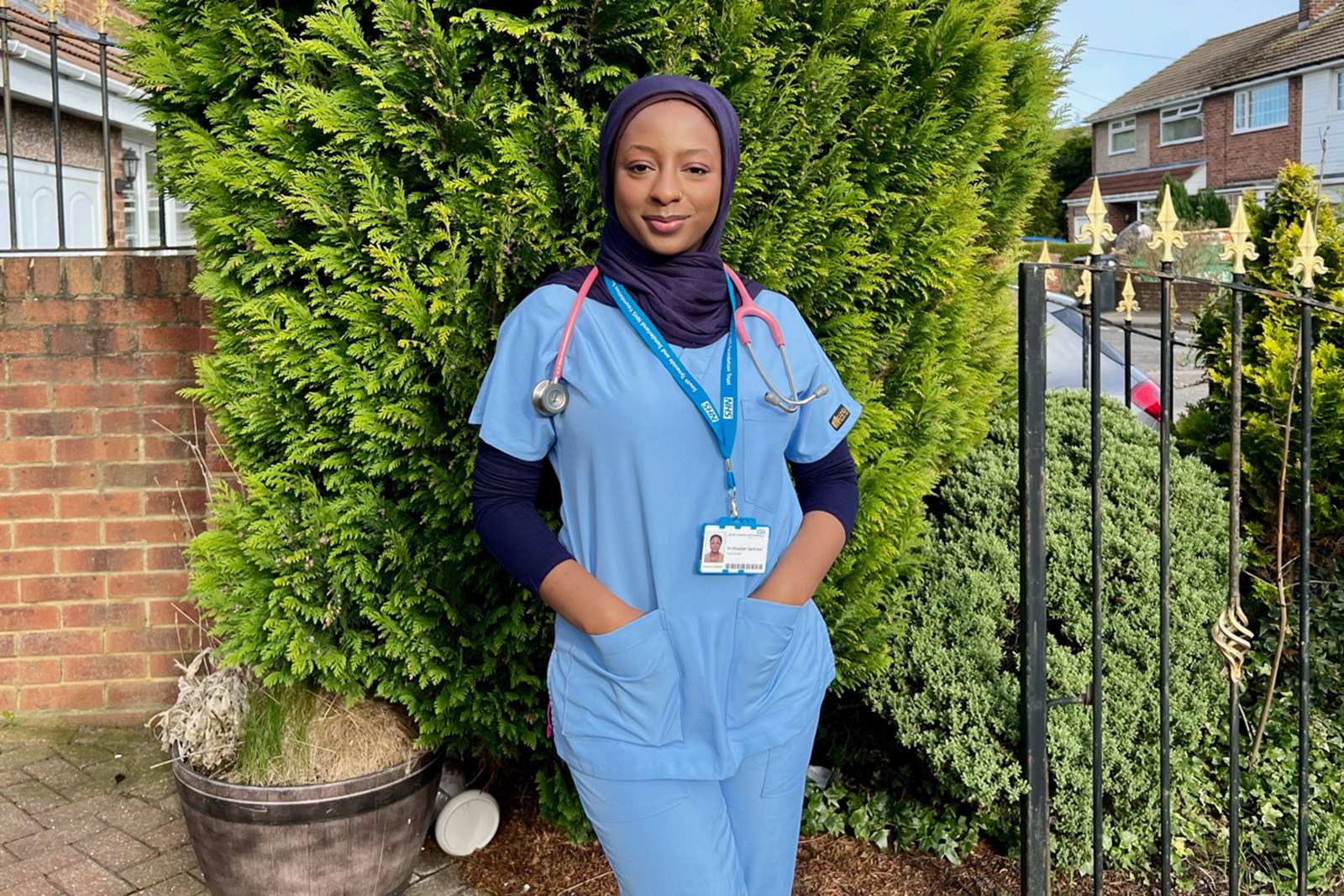My Ramadan: NHS doctor Khadijah Garkuwa
This Ramadan is Khadijah Garkuwa’s first as a junior A&E doctor. Here, she talks about balancing the demands of her work with fasting, prayer and contemplation
–

Khadijah Garkuwa, 29, is a junior doctor working in the accident and emergency department of South Tyneside District Hospital in South Shields. This is Garkuwa’s first Ramadan working as an NHS doctor. We spoke to her about navigating a high-pressure job during the holy month and fasting while on call.
This interview has been edited for length and clarity.
How do you manage to hold down such a demanding job and navigate the changing shift patterns during Ramadan?
I have a very supportive senior management. I have taken some time off work during Ramadan, which they have been understanding about. They even tell me to go and break my fast when it is time. Our team is very multicultural and most of the registrars are also fasting, so sometimes they’ll bring in food from home to share for iftar. Last week, we had some biryani made by one of their wives. Next time I’m on shift during iftar, I’m planning on taking some Nigerian food, like jollof rice or fried rice and fried chicken. I’m really lucky to work in such an encouraging environment.
How does the unpredictability of accident and emergency work affect you?
When it is time to break the fast, you can’t just stop what you’re doing to eat if you’re in the middle of dealing with a patient. You have to complete the task or ensure your patient is stable enough — not doing so would be neglect and a poor quality of care. Sometimes, when you’re on the way to the break room, somebody hits the emergency buzzer and you have to run straight back to the department. That sound could mean that someone has collapsed, is having a heart attack or worse. At that point, the hunger disappears and you’re filled with adrenaline. You completely forget about food.
Do you feel that the all-consuming nature of your job makes you miss out on the spiritual side of Ramadan?
Yes, a little. That’s why I requested some time off during the month. I want to be doing more than the bare minimum of fasting. For me, Ramadan is not just about that. It’s about all the additional prayers you do. It’s about going to pray additional taraweeh evening prayers at the mosque, standing in the congregation and hearing the imam preach. Those moments remind me that this is what Ramadan is all about. I need to make sure that I get the most out of these moments. At home, I can get distracted and there’s nothing to hold me accountable, unlike when I’m praying in the mosque.
What specific challenges does Ramadan add to your work as a doctor?
I think the hardest part is trying to stay focused while running low on energy. Things are fast-paced, queues might be long and nurses could be coming in asking you to do things while you’re very fatigued. It’s tough running on smaller amounts of sleep and little energy, but it doesn’t mean you’re working any less efficiently. I have to give myself a lot of grace when I feel like I’m moving a bit slower than normal.
Of course, I don’t want to feel like I’m not performing well due to my religious beliefs. I already get so much freedom to have iftar and to go do my prayers, and I don’t want to feel like I’m getting all these allowances and not performing to the best of my ability. It’s not a pressure that comes from the NHS or other staff members, but more of a pressure that I put on myself.
What’s your favourite Ramadan memory?
The Ramadan that took place during the coronavirus lockdown of 2020 was probably one of my favourites because the Ramadan spirit was so strong in my house that year. My dad and my sister were doing a challenge in which they decided to read the entire Qur’an during the month. Every day, we’d wake up and hear them downstairs reciting the Qur’an together. That sound ended up becoming our alarm clock. As we were all at home, my mum, my brothers and I would gather around and listen to them and try to read along with them. The day they completed the Qur’an, we all cheered and there was just so much joy in our house.
Topics
Get the Hyphen weekly
Subscribe to Hyphen’s weekly round-up for insightful reportage, commentary and the latest arts and lifestyle coverage, from across the UK and Europe
This form may not be visible due to adblockers, or JavaScript not being enabled.